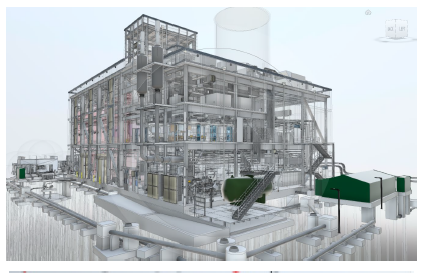Despite Phil Murphy's halt, NJ agency presses on with Passaic River power plant proposal
- Oops!Something went wrong.Please try again later.
Two months after Gov. Phil Murphy temporarily halted the project, a state agency under his control is still moving forward with plans to build a gas-fired power plant along the Passaic River, leaving opponents to question the governor's commitment to clean energy and environmental justice.
Residents, environmentalists, physicians and others pleaded with the state Department of Environmental Protection at an online hearing Tuesday night to deny a key air permit to the Passaic Valley Sewerage Commission, saying the power plant it wants to build in Newark adds more pollution to an already overburdened community.
"We’re already suffering from the effects of pollution in this area, so we do not need another gas-powered generator," said Iveth Mosquera of Kearny, whose two children have asthma.
In response to the criticism, the sewage plant will add more renewable energy sources elsewhere to help offset the emissions from the proposed power plant, which would be used only as an emergency backup, commission members and their consultants said Tuesday. The sewage plant lost power for three days after Superstorm Sandy in 2012, which caused 840 million gallons of raw sewage to pour into Newark Bay and surrounding waterways.

Greg Tramontozzi, the commission's executive director, said Tuesday that the plant would be turned on only one day each month for testing and maintenance during non-emergencies. He said the plant would have advanced emission controls to limit air pollution.
"During the year in which no emergencies take place, the power generation facility would be offline for 353 days," Tramontozzi said.
The hearing, which lasted more than three hours, was designed to look at the impact the facility would have on an environmental justice community — a designation for areas that have a disproportionate share of pollution-generating facilities and have a large minority population. The area around the plant is filled with factories, a large incinerator, multiple power plants and Port Newark, and is surrounded by highways.
While air quality has gotten better in recent years, North Jersey and New York City still rank 14th in the U.S. for smog days, according to a report released last week by the American Lung Association.
Opponents said the plant would pump greenhouse gases into the atmosphere and exacerbate the intensity and frequency of storms like Sandy by slowly warming the planet.
At the center of this debate is a 2020 environmental justice law signed by Murphy that is designed to build fewer polluting projects in communities of color. It allows the DEP to deny a permit if it finds that the cumulative environmental or public health impact of a project would be higher in an overburdened community than in other, non-burdened New Jersey communities.
Environmental news: New Jersey's new plastic bag ban is coming, and readers have questions. We have answers.
COVID treatment: Anti-viral COVID drugs are available in NJ, but the medicines are hard to get. Here's why
But rules to implement the law are still being developed by the agency, and an interim order doesn't force the DEP to take into account the cumulative historical impacts that pollution has had on the communities around the plant, including Newark's Ironbound.
The project is already well underway. The commission has awarded a $51 million contract to Siemens for equipment including three turbines that have already been built and are "ready to be shipped to PVSC upon notice," according to a commission report.
But in January, Murphy stopped the commission from voting on another aspect of the construction, saying it needed a more thorough review to ensure that "the project adheres to the administration's core values on environmental justice."
In response, commission consultants said Tuesday that they now plan to run the proposed power plant less often, add more solar power for the sewage plant's operations and take other fossil-fuel turbines offline by 2030.
Those moves "would reduce emissions elsewhere on the site to more than offset actual emissions from the project," said Cynthia Hibbard, of the engineering firm CDM Smith.
Opponents say it doesn't go far enough and question the commission's claims that the new power plant along with these green measures would result in a reduction of air pollutants.
"It should be giving Newark those reductions anywa, unrelated to the new plant," said Nicky Sheats, director of the Center for the Urban Environment at Kean University. "The question is: why aren't they making these reductions now?"
Scott Fallon has covered the COVID-19 pandemic since its onset in March 2020. To get unlimited access to the latest news about the pandemic's impact on New Jersey, please subscribe or activate your digital account today.
Email: fallon@northjersey.com
Twitter: @newsfallon
This article originally appeared on NorthJersey.com: Power plant on Passaic River proposal moves forward
